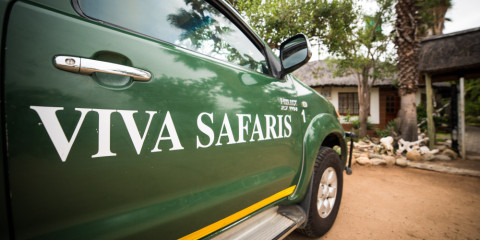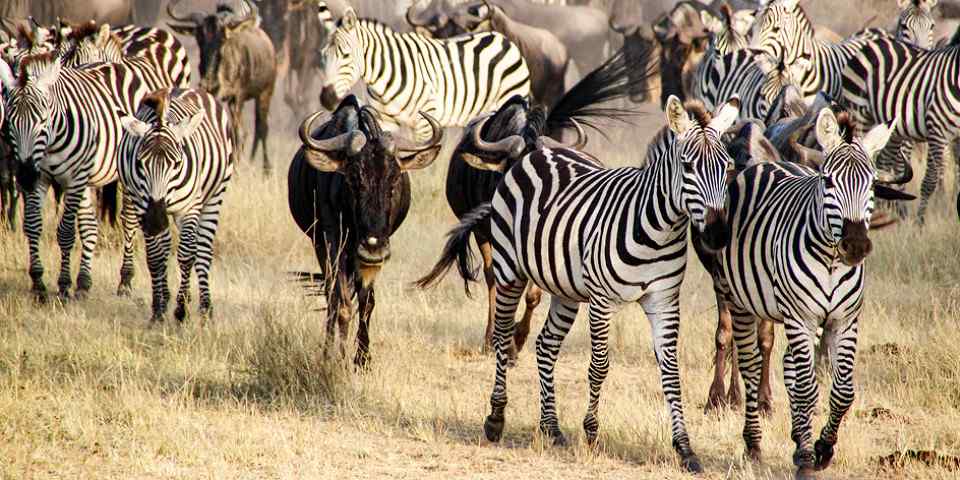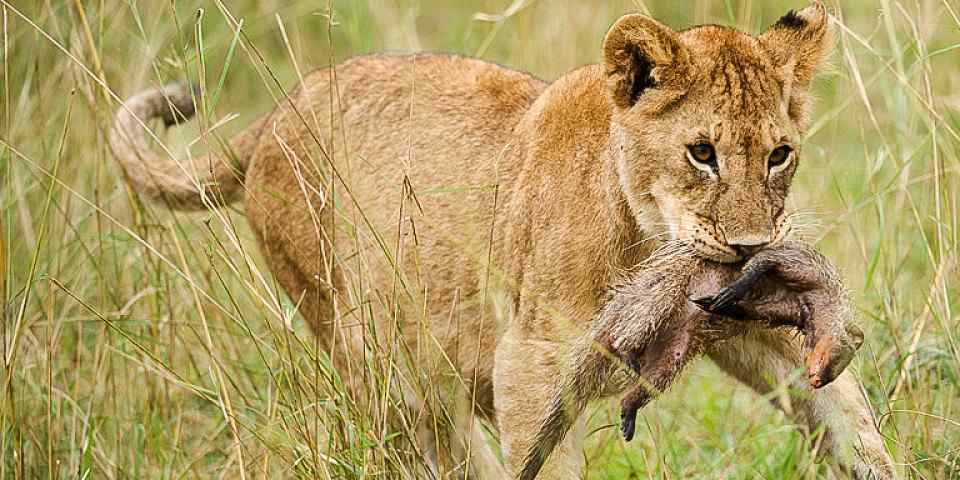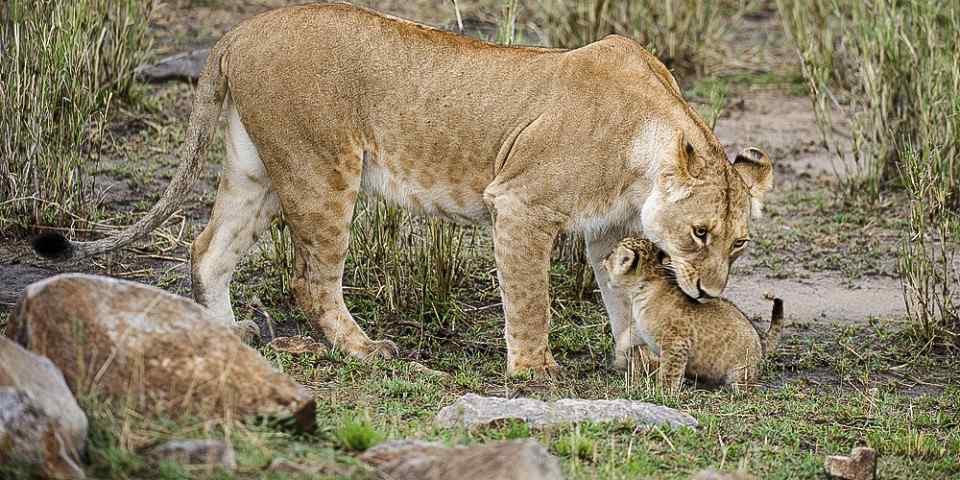Tour Length
Rates in USD $ – Change Currency
Per person, excl. international flightsOperator Rating
Other Tour Features
Filter by Operator
Filter by Accommodation
African Group Safaris & Tours
Signing up to an African safari group tour is one of the most popular ways to go on safari. Having an expert plan the nitty-gritty of your safari package for you saves time and hassle. It means all you have to do is read up on African wildlife and hop on a plane. A small group tour can be a great way to see Africa. Special-interest group trips, such as bird watching, conservation or big cats, are recommended. A special-interest trip will put you in a group with like-minded people, and the guide will be an expert. Before jumping into a group safari though, there are a few things to consider.
-
Best Seller

4-Day Wilderness in Tarangire, Serengeti and Ngorongoro
$1,430 pp (USD)
Tanzania: Shared tour (max 6 people per vehicle)
Mid-range Camping & LodgeYou Visit: Zanzibar (Start), Tarangire NP, Serengeti NP, Ngorongoro Crater, Zanzibar (End)

Kilipath African Safari
4.9/5 – 137 Reviews
-
Top Rated Operator

7-Day Tremisana Lodge - Kruger Park Safari
$1,316 pp (USD)
South Africa: Shared tour (max 9 people per vehicle)
Mid-range LodgeYou Visit: Johannesburg (Start), Balule NR (Greater Kruger), Greater Kruger, Kruger NP, Moholoholo Wildlife Centre (Wildlife Sanctuary), 3 Rondavels (Panorama Route), Johannesburg (End)

Viva Safaris
5.0/5 – 308 Reviews
-

4-Day Shared Group Budget Camping
$735 pp (USD)
Tanzania: Shared tour (max 7 people per vehicle)BudgetCamping
You Visit: Arusha (Start), Tarangire NP, Serengeti NP, Ngorongoro Highlands, Ngorongoro Crater, Arusha (End)

African Chitah
4.9/5 – 86 Reviews
-
Top Rated Operator

5-Day Tanzania Mid Range -Private Safari
$1,650 pp (USD)
Tanzania: Shared tour (max 7 people per vehicle)
Mid-range Lodge & Tented CampYou Visit: Arusha (Start), Tarangire NP, Serengeti NP, Ngorongoro Crater, Lake Manyara NP, Arusha (End)

Migration Venture Africa
4.8/5 – 394 Reviews
-
![8-Day Kenya Safari Masai Mara Nakuru Naivasha Amboseli]()
8-Day Kenya Safari Masai Mara Nakuru Naivasha Amboseli
$990 to $1,320 pp (USD)
Kenya: Shared tour (max 7 people per vehicle)BudgetTented Camp & Hotel
You Visit: Nairobi (Start), Masai Mara NR, Lake Nakuru NP, Lake Naivasha (Naivasha), Amboseli NP, Nairobi (End)

Bienvenido Kenya Tours and Safaris
4.7/5 – 124 Reviews
-
![5-Day Join Tour Serengeti Crater Manyara and Tarangire]()
5-Day Join Tour Serengeti Crater Manyara and Tarangire
$990 pp (USD)
Tanzania: Shared tour (max 6 people per vehicle)BudgetCamping
You Visit: Arusha (Start), Tarangire NP, Serengeti NP, Ngorongoro Crater, Arusha (End)

Taswira Africa Safaris
5.0/5 – 27 Reviews
-
Top Rated Operator

4-Day Radisson Luxury Fly-in Kruger from Cape Town
$1,544 pp (USD)
South Africa: Shared tour (max 10 people per vehicle)LuxuryHotel
You Visit: Cape Town (Start), Hoedspruit (Town), Kruger NP, Panorama Route (Highlight), Cape Town (End)

MoAfrika Tours
4.9/5 – 2,401 Reviews
-
![6-Day Midrange Safari and Materuni Waterfalls Experience]()
6-Day Midrange Safari and Materuni Waterfalls Experience
$1,730 pp (USD)
Tanzania: Shared tour (max 7 people per vehicle)
Mid-range Lodge & Tented Bush CampYou Visit: Arusha (Start), Tarangire NP, Serengeti NP, Ngorongoro Crater, Lake Manyara NP, Materuni Waterfalls (Highlight), Arusha (End)

Go Makini Tanzania Expedition
4.9/5 – 75 Reviews
-
Top Rated Operator
![4-Day Group Tour to Tarangire, Serengeti, Ngorongoro]()
4-Day Group Tour to Tarangire, Serengeti, Ngorongoro
$825 pp (USD)
Tanzania: Shared tour (max 6 people per vehicle)BudgetCamping
You Visit: Arusha (Start), Tarangire NP, Serengeti NP, Ngorongoro Crater, Arusha (End)

Suricata Safaris
5.0/5 – 2,794 Reviews
-
![8-Day Group Joining Calving Season ( Shared Tour)]()
8-Day Group Joining Calving Season ( Shared Tour)
$3,080 pp (USD)
Scheduled Start DatesTanzania: Shared tour (max 6 people per vehicle)
Mid-range Lodge & Tented CampYou Visit: Arusha (Start), Tarangire NP, Central Serengeti NP, Ndutu (Southern Serengeti NP), Ngorongoro Crater, Kilimanjaro Airport (End)

Nature Responsible Safari Company
5.0/5 – 56 Reviews
-
![6-Day Lake Nakuru, Masai Mara, Lake Naivasha, & Amboseli]()
6-Day Lake Nakuru, Masai Mara, Lake Naivasha, & Amboseli
$1,528 to $2,099 pp (USD)
Scheduled Start DatesKenya: Shared tour (max 6 people per vehicle)
Mid-range Lodge & Tented CampYou Visit: Nairobi (Start), Lake Nakuru NP, Masai Mara NR, Lake Naivasha (Naivasha), Amboseli NP, Nairobi (End)

Campofrio Safaris
4.9/5 – 23 Reviews
-
Best Seller
![6-Day More Nights in Serengeti the Ultimate Adventure]()
6-Day More Nights in Serengeti the Ultimate Adventure
$1,491 pp (USD)
Tanzania: Shared tour (max 6 people per vehicle)
Mid-range Lodge & Tented CampYou Visit: Arusha (Start), Tarangire NP, Central Serengeti NP, Northern Serengeti NP, Serengeti NP, Ngorongoro Crater, Arusha (End)

Tanzania Pilgrimage Safaris
5.0/5 – 30 Reviews
-
![11-Day Kalahari, Okavango and Chobe Expedition]()
11-Day Kalahari, Okavango and Chobe Expedition
$5,412 pp (USD)
Botswana & Zimbabwe: Shared tour (max 8 people per vehicle)
Mid-range Camping & LodgeYou Visit: Maun (Start), Central Kalahari GR, Maun (City), Moremi GR (Okavango Delta), Khwai Concession (Okavango Delta), Savuti (Chobe NP), Kasane (Town), Chobe NP, Victoria Falls (End)

Reflect Africa Expedition
5.0/5 – 19 Reviews
-
![9-Day All Lodge; Vic Falls to Okavango (Mokoro + Scenic)]()
9-Day All Lodge; Vic Falls to Okavango (Mokoro + Scenic)
$3,025 pp (USD)
Botswana & Zimbabwe: Shared tour (max 6 people per vehicle)
Mid-range Lodge & Tented CampYou Visit: Victoria Falls (Start), Chobe Riverfront (Chobe NP), Elephant Sands, Makgadikgadi Pans NP, Maun (City), Okavango Delta, Maun Airport (End)

Sekanka Travel and Tours Safaris
4.9/5 – 66 Reviews
-
Top Rated Operator
![7-Day Amboseli Lake Nakuru Lake Naivasha and Masai Mara]()
7-Day Amboseli Lake Nakuru Lake Naivasha and Masai Mara
$825 pp (USD)
Kenya: Shared tour (max 6 people per vehicle)BudgetTented Camp & Hotel
You Visit: Nairobi (Start), Masai Mara NR, Lake Nakuru NP, Hell’s Gate NP, Amboseli NP, Nairobi (End)

Aanika Karibu Safaris In Kenya
4.8/5 – 1,489 Reviews
-
![3-Day Masai Mara Sopa Lodge Daily Group Tour]()
3-Day Masai Mara Sopa Lodge Daily Group Tour
$485 to $895 pp (USD)
Kenya: Shared tour (max 7 people per vehicle)
Mid-range LodgeYou Visit: Nairobi (Start), Masai Mara NR, Nairobi (End)

Balu Travel
4.9/5 – 96 Reviews
-
![5-Day Explore Nature in Close Camping Budget Safari]()
5-Day Explore Nature in Close Camping Budget Safari
$968 pp (USD)
Tanzania: Shared tour (max 6 people per vehicle)BudgetGuest House & Hotel
You Visit: Arusha (Start), Tarangire NP, Serengeti NP, Central Serengeti NP, Ngorongoro Crater, Lake Manyara NP, Arusha (End)

Adventures In Tanzania Safari
4.6/5 – 13 Reviews
-
![4-Day Masai Mara and Lake Nakuru Group Joining Tour]()
4-Day Masai Mara and Lake Nakuru Group Joining Tour
$575 pp (USD)
Kenya: Shared tour (max 6 people per vehicle)BudgetTented Camp & Hotel
You Visit: Nairobi (Start), Masai Mara NR, Lake Nakuru NP, Nairobi (End)

African Vulture Safaris
5.0/5 – 57 Reviews
-
![8-Day Amboseli, Masai Mara, Lake Nakuru & Mombasa]()
8-Day Amboseli, Masai Mara, Lake Nakuru & Mombasa
$1,320 to $1,386 pp (USD)
Kenya: Shared tour (max 7 people per vehicle)BudgetTented Camp & Resort
You Visit: Nairobi (Start), Masai Mara NR, Lake Nakuru NP, Amboseli NP, Mombasa Beaches, Haller Park (Highlight), Nairobi (End)

Eta Adventure Safaris
4.8/5 – 32 Reviews
-
Top Rated Operator
![7-Day Tanzania Holiday Experience & Materuni Waterfalls]()
7-Day Tanzania Holiday Experience & Materuni Waterfalls
$1,300 pp (USD)
Tanzania: Shared tour (max 6 people per vehicle)BudgetCamping & Hotel
You Visit: Arusha (Start), Tarangire NP, Serengeti NP, Ngorongoro Crater, Lake Manyara NP, Materuni Waterfalls (Highlight), Arusha (End)

Go Serengeti African Tours
4.9/5 – 297 Reviews
6 Questions About Group Safari Tours

Answered by
Stuart Butler
Stuart Butler is a travel writer, photographer and author of many guidebooks for Lonely Planet, Rough Guides and Bradt, including guides to Kenya, Ethiopia, Rwanda and Tanzania. Over the past 25 years he has traveled widely in Africa and spends considerable time there each year on group safaris.› More about Stuart
6 Questions About Group Safari Tours
 Stuart Butler
Stuart Butler
Why should I choose an African group safari?
“The simple answer is cost. A group safari invariably costs less than a private safari of the same quality. However, there are other reasons. If you’re the type of traveler who likes to make new friends on holiday, a group safari is the obvious way to go. There are also many specialized or expert-led group safari trips available. These allow you to have experiences that you wouldn’t have on a private safari. For example, a safari led by a renowned elephant or big cat expert will bring knowledge and add depth to your safari. There are also group safaris based on specific activities, such as birding. A small-group safari tour can be ideal for the single traveler who’d rather not travel alone.”
1How is a group safari different from a private safari?
“As you might expect on a group safari, your schedule is largely fixed. Any minor changes are made at the request of the whole group. In most cases this isn’t likely to be much of a problem. What can be more problematic though is sorting out priorities when on a game drive. For example, if you’re a keen birder but the rest of your group is only interested in the Big Five (elephant, lion, leopard, buffalo and rhino). Or the whole group might be interested in seeing an elephant, but some want to stay longer while others are happy just taking a quick snapshot. Being on a group safari doesn’t mean that you’re going to spend 24 hours a day with the same people. Most likely you’ll only be together when on safari or traveling to and from a park. In the camp, you’ll be left to your own devices. The advantage of a private safari is that you’ll make all your own decisions on schedules and safari details. However, you’re going to pay much more for the pleasure.”
2What is the typical size of a group on a shared trip?
“On a budget safari there can be up to 10 people in the vehicle, which can detract from the wildlife-viewing experience. If you’ve signed up to a multicountry overland tour in a specially designed bus, you should check the maximum number of people they will fit into the bus. Note though, in many parks and reserves these kinds of vehicles are banned. If you’re on a mid-range group safari, there will likely be between four and six people in the group. On a high-end safari, there isn’t much difference between a group safari and a private safari.”
3What happens if I sign up for a group tour but it doesn’t attract enough people?
“Every company will have its own terms and conditions. You should check these carefully before signing up. Reputable companies will try and make satisfactory alternative arrangements for you. This most likely means altering the route somewhat to be able to merge two small groups into one. Otherwise you’ll be given the options of paying a bit more for the tour operator to run the safari as advertised or canceling and getting a full reimbursement. Reimbursements don’t include any flights purchased. Or, alternative travel dates might be offered. Make sure you read the fine print and ask if anything is unclear or missing. Always choose your operator carefully. Reading recent reviews can be useful.”
4What type of vehicles can I expect?
“This depends on how much you pay for a safari. On a budget safari in Kenya, for example, you’ll most likely end up in a minibus with a pop-top roof. This isn’t ideal. In these vehicles, windows don’t always open fully. If the vehicle is full, not everyone will even get a window seat. This means that most of the time you’ll have to make do with standing and peering out of the open roof. This doesn’t give the best perspective of the animals, and it can still mean limited space for each safari-goer. Such minibuses are, however, banned in most Tanzanian parks. At the opposite end, on a high-cost luxury group safari you’ll be in a long-wheel-base 4x4 customized for safaris. It will be an open-sided vehicle, and the number of people in the vehicle will be kept to a minimum. This means that whichever side of the vehicle an animal is, you will have a front-seat view. These vehicles often also have camera platforms or beanbags. They also have extra suspension, making for a generally smooth ride on the bumpy roads.”
5What should I consider when choosing an African group tour?
“Does the tour visit all the parks and reserves you want to visit? This is the first thing you should look at when considering a group safari. If you have dreams of seeing the Serengeti–Mara wildebeest migration, there’s no point booking a group safari that doesn’t visit the Serengeti or Masai Mara. Also make sure you’re in the right part of the park at the right time of year. Ensure the tour doesn’t visit too many parks and reserves. If it sounds rushed on paper, then it will be hectic when you hit the ground. Many group safaris try to cram in too much in too short a time. The result is that you spend more time traveling to and from parks than on safari. Another very important point is to check the type of vehicle used and how many other people will be in your group. The smaller the overall group size the better. Consider if you have a special interest that might not be compatible with a group tour. For example, if you’re a bird-watcher or a serious photographer, look for a specialist tour dedicated to your interest.”
6




_1269_6626c73f104ed.960x480-72.jpg)














_4267_5dfe8c91979d9.gif)












